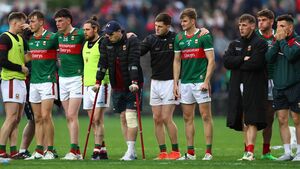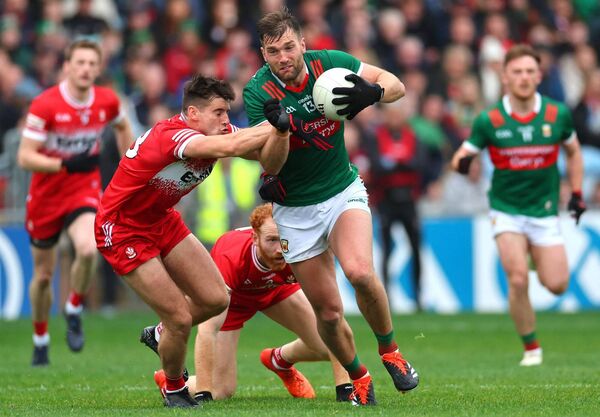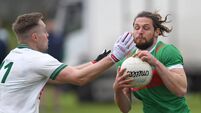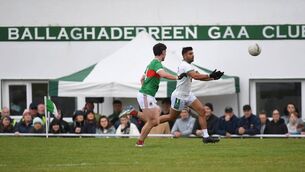A spent player or time not wisely spent?

The agony of watching the penalty shoot-out unfold is etched upon the faces of Mayo players whose fate was now in the hands of others, after a drawn game with Derry in last Saturday's All-Ireland SFC preliminary quarter-final. Pictures: INPHO/James Crombie
In games of fine margins you’ll wonder afterwards which little thing had the biggest consequence because, yes, it’s the small things that sometimes really do catch you.
Mayo were a point in front of Derry and two of what turned into five minutes of stoppage time had been played when it was decided by the management to withdraw Aidan O’Shea from the action.
The giant attacker, he who has played more championship football than any other outfield player in the history of the game, had been a colossus for Mayo in the second-half of Saturday's All-Ireland SFC preliminary quarter-final, leading the revival that had seen them go from three points behind at half-time to mere seconds from booking their ticket to next weekend’s last eight.
It was O’Shea who had ploughed through to kick an equalising point in the 41st minute and O’Shea who, four minutes later, was fouled for the free that Ryan O’Donoghue scored to kick Mayo in front for the first time. And Mayo’s next score was also a result of O’Shea’s input, with his pinpoint delivery to O’Donoghue in the 50th minute seeing the Belmullet man cleverly flick the ball on for Darren McHale who combined with Tommy Conroy to force the penalty that helped send Mayo two points clear. Much earlier in the game too, it was Aidan O’Shea who won the free from which O’Donoghue, crucially, ended an almost 15-minute scoreless spell by Mayo to score the final point of the first-half. And how O’Shea’s marker Chrissy McKaigue escaped any sort of censure for his rugby-type take-down of O’Shea in front of the stand at the end of the opening quarter is still a source of bewilderment.
It was McKaigue, however, who, relieved (in every sense) of his onerous full-back duties upon the removal of Aidan O’Shea from the field in the 72nd minute, used his new-found freedom to plonk himself in front of the Mayo posts and in the absolute fumes of stoppage time, fist the point that forced the match to extra-time – all while he who had been Mayo’s best player was sat in the stand.
The careers of Aidan O’Shea and Chrissy McKaigue are inextricably linked. The pair made their respective National Football League debuts in the same Division 1 game at James Stephens Park, Ballina on Sunday, February 1, 2009 – with 18-year-old O’Shea sent in by then Mayo manager John O’Mahony as a replacement for Trevor Mortimer after 52 minutes.
15 years on, Trevor Mortimer was none too pleased with the decision to substitute O’Shea last Saturday evening. Agreeing with a post-match comment by RTÉ analyst and former Sligo footballer Eamonn O’Hara on X (or Twitter) who said “Another day and another shocking decision by the Mayo sideline to take Aidan O’Shea off,” former Mayo captain Mortimer added: “No logic at all… game in the melting pot… one man who can hold up ball for you and get frees… done same thing against Galway with game in melting pot.”

McKaigue, a year older than O’Shea and who in 2022 at age 33 became one of the oldest first-time winners of an All-Star, remained on the pitch for the entirety of extra-time last Saturday night while his adversary was never seen again. In contrast, Derry boss Mickey Harte wilfully called ashore three players who he had only introduced inside the final five minutes of normal time and reintroduced the players who had been replaced, to ensure he had his strongest possible team on the pitch for the duration of extra-time. One of those brought back on, Conor Doherty, was to kick the match-winning penalty in the shoot-out. Little things, big consequences – like Mickey Harte managing to ensure that all five of Derry’s penalty takers in this season’s Division 1 final shoot-out victory over Dublin in Croke Park were still on the pitch at the end of the 90-plus minutes to take the five penalties last Saturday evening as well.
Asked afterwards about the reason for taking off Aidan O’Shea, Kevin McStay said: “We felt he was spent,” adding that “Again, tonight, am I right, he was immense.”
It was that particular comment that caused one local reporter to immediately interject and ask: “Why did you take him off then?” The look on the manager’s face couldn’t have been more contorted had he been prescribed watching reruns of Sam Callinan’s missed fisted attempt to cure a winter vomiting bug. McStay made it known he didn’t appreciate the reporter’s adversarial tone before turning the question back on him.
“You take a guess why we took him off.”
“It’s not for me to answer,” the reporter replied.
And nor is it for any of us to know whether the outcome would have changed had 34-year-old Aidan O’Shea been on the pitch for those final minutes of normal time, or for some or all of extra-time for that matter. He was, after all, on the pitch when Mayo surrendered a one-point lead at the death against Dublin only six days previous. But here’s a question. If a management team can be so precise that they believe one player, arguably their best and most influential, has all but two or three minutes of a full game in their legs, would they rather that player be on the pitch for the first two or three minutes or the last, when the fat truly was in the fire?
Of course, it would seem a dramatic – and possibly foolish – thing to launch any player into a game just minutes after throw-in, not least because of how uncomfortable it would be on the player called ashore so early, and the potential of injuries later in the game leaving you short-staffed, but Mickey Harte, then in charge of his native Tyrone, used up two substitutes to win an All-Ireland Final by starting, withdrawing and reintroducing Peter Canavan against Kerry in 2005.
Canavan scored Tyrone’s only goal on the stroke of half-time after which Harte took the 34-year-old to rest some before sending him back in.
“More evidence of how they were re-thinking the game,” wrote Kerry great Colm Cooper in his autobiography. “We ended up chasing the game and, in the dying seconds, Canavan pulled me down with a virtual rugby tackle as I sprinted to take a return pass. Their best player doing whatever it took.”
Their best player. Still on the pitch. Just when his team needed him most.






